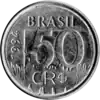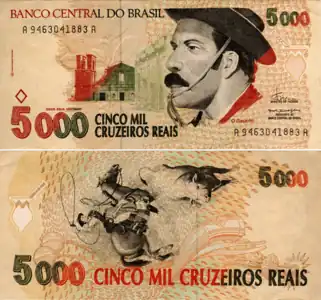Brazilian cruzeiro real
The cruzeiro real (, plural: cruzeiros reais) was the short-lived currency of Brazil between August 1, 1993, and June 30, 1994. It was subdivided in 100 centavos; however, this unit was used only for accounting purposes, and the coins and banknotes still valid for cruzeiro between 10 and 500 cruzeiros were used for the purpose of corresponding to the cents of that coin, especially when the redenomination was carried out. The currency had the ISO 4217 code BRR.
 A 1993 CR$5,000 banknote | |
| ISO 4217 | |
|---|---|
| Code | BRR |
| Unit | |
| Unit | cruzeiro real |
| Plural | cruzeiros reais |
| Symbol | CR$ |
| Denominations | |
| Subunit | |
| 1⁄100 | centavo (only used for accounting purposes) |
| Banknotes | |
| Freq. used | 50, 100, 500, 1000, 5000 and 50,000 cruzeiros reais |
| Coins | |
| Freq. used | 5, 10, 50, 100 cruzeiros reais |
| Demographics | |
| Replaced | Cruzeiro (3rd version) |
| Replaced by | Real |
| User(s) | |
| Issuance | |
| Central bank | Central Bank of Brazil |
| Website | www |
| Printer | Casa da Moeda do Brasil |
| Website | www |
| Mint | Casa da Moeda do Brasil |
| Website | www |
| This infobox shows the latest status before this currency was rendered obsolete. | |
This redenomination, at the beginning of the second half of 1993, was made with the objective of facilitating the accounting of day-to-day activities, which in the previous unit implied the placement of several zeros that made it difficult to record values in calculators and machines.
The cruzeiro real was replaced with the current Brazilian real as part of the Plano Real.
History
The cruzeiro real replaced the third cruzeiro, with 1000 cruzeiros = 1 cruzeiro real. The cruzeiro real was replaced in circulation by the real at a rate of 1 real for 2750 cruzeiros reais. Before this occurred, the unidade real de valor (pegged to the U.S. dollar at parity) was used in pricing, to allow the population to become accustomed to a stable currency (after many years of high inflation) before the real was introduced.
Coins
Standard circulation stainless-steel coins were issued in 1993 and 1994 in denominations of 5, 10, 50 and 100 cruzeiros reais. The reverse of the coins portrayed iconic animals of the Brazilian fauna.
No commemorative coins were issued for the Cruzeiro Real.
| Reverse | Obverse | Value | Details |
|---|---|---|---|
 |  | CR$5 | Portrays macaws |
 |  | CR$10 | Portrays a giant anteater |
 |  | CR$50 | Portrays jaguars |
 |  | CR$100 | Portrays a maned wolf |
The macaw and jaguar were represented again in the Real's R$10 and R$50 bills, respectively, after their introduction in 1994, and the maned wolf was later portrayed in the R$200 bill since its introduction in late 2020.[1]
Banknotes

In 1993, provisional banknotes were introduced in the form of cruzeiro notes overprinted in the new currency. These were in denominations of 50, 100 and 500 cruzeiros reais. Regular notes followed in denominations of 1000, 5000 and 50,000 cruzeiros reais. The 10,000 cruzeiros reais banknote was designed and scheduled to be put into circulation in the first months of 1994, but inflation and the impending release of a new economic plan put its release on hold and only the 50,000 Cruzeiro real banknote was released.[3]
References
- Fonseca, Jaqueline (31 July 2020). "Conheça o lobo-guará, animal do cerrado que estampa nota de R$ 200". Correio Braziliense (in Brazilian Portuguese). Retrieved 1 February 2021.
- 50,000 Cruzeiro real banknote Brazilian Central Bank Museum, accessed in January 3, 2016.
- Dez Mil Cruzeiros Reais (1993) - A Cédula que Nunca Circulou Archived 2015-06-07 at the Wayback Machine Dinheiro de Metal, accessed in January 3, 2016.
- Krause, Chester L.; Clifford Mishler (1991). Standard Catalog of World Coins: 1801–1991 (18th ed.). Krause Publications. ISBN 0873411501.
- Pick, Albert (1994). Standard Catalog of World Paper Money: General Issues. Colin R. Bruce II and Neil Shafer (editors) (7th ed.). Krause Publications. ISBN 0-87341-207-9.
